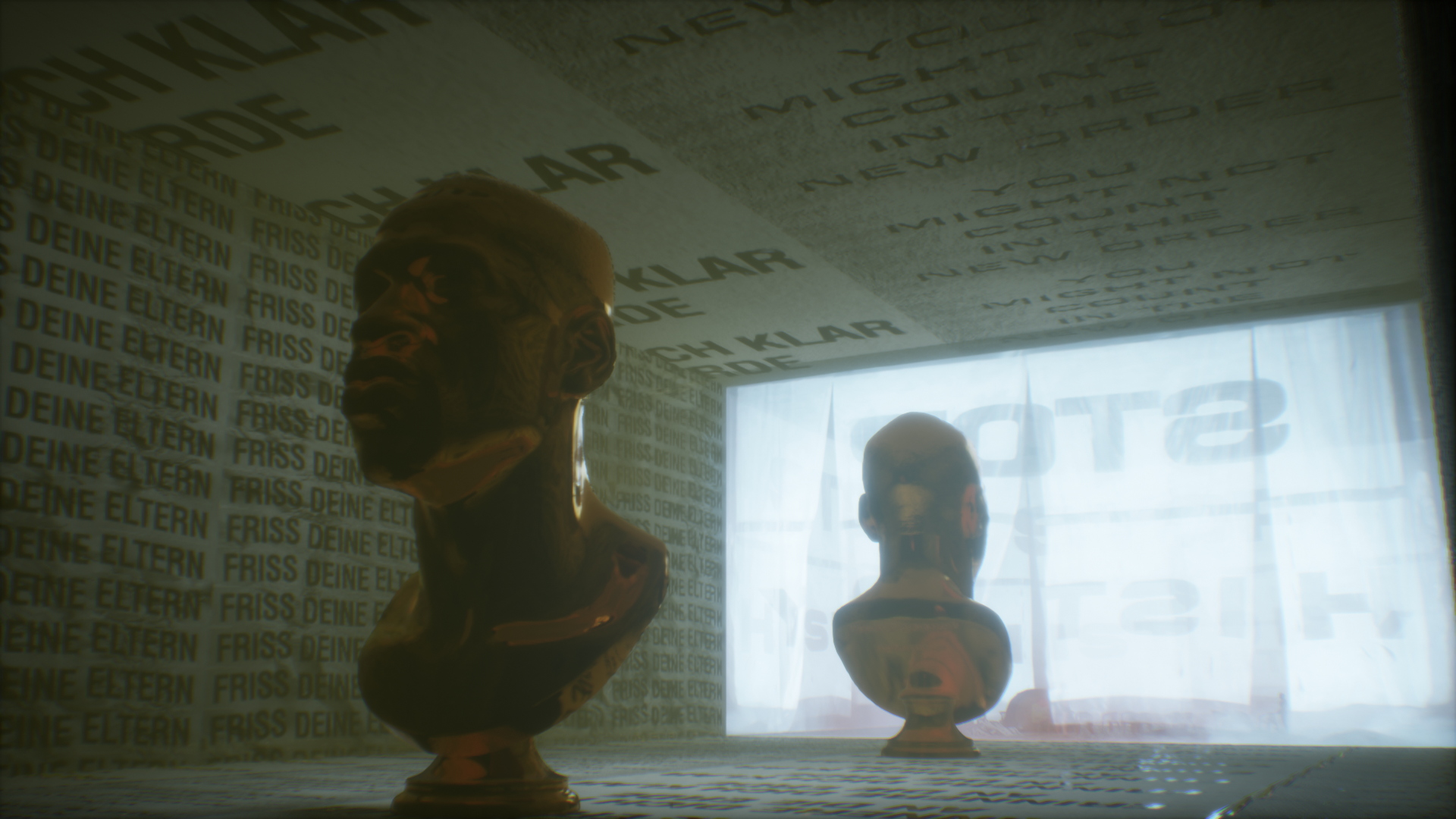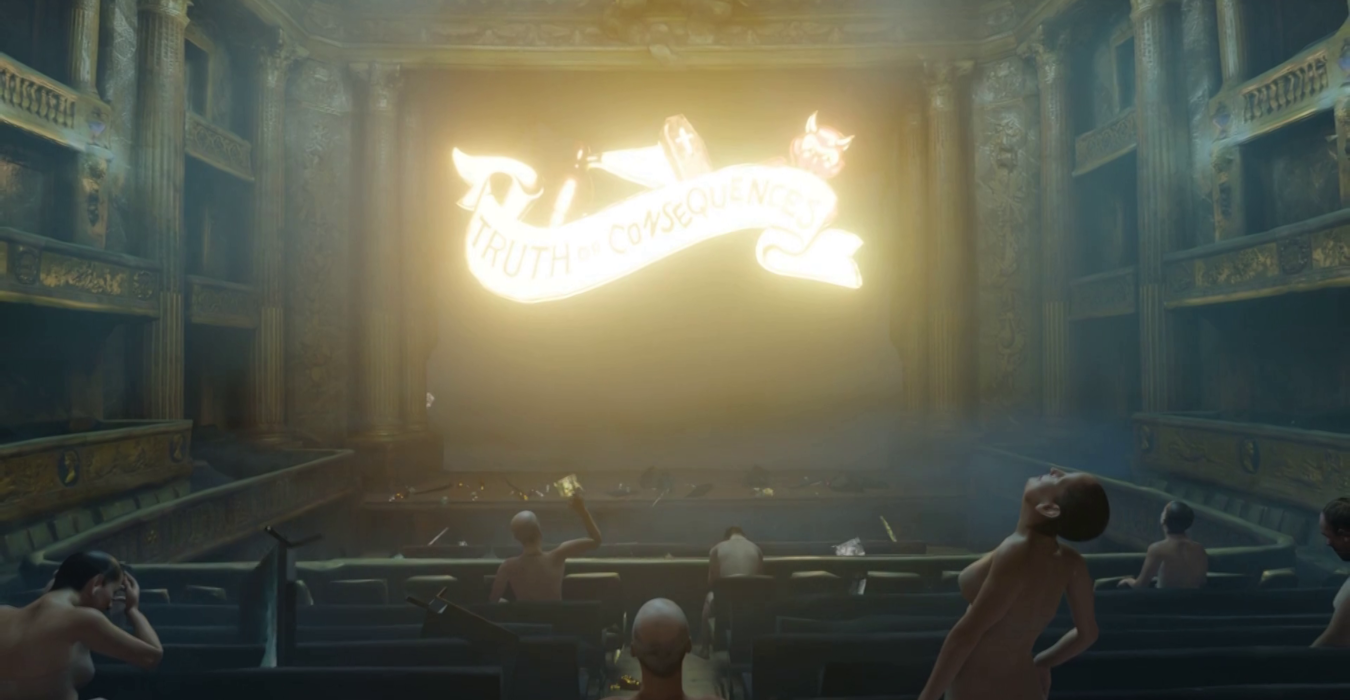“opera – a future game” is an interactive and digital music theatre video game essay in a game engine, based on the opera “opera opera! revenants&revolutions” directed by Michael zur Mühlen, with music by Ole Hübner and texts by Thomas Köck.
The narrative starting point could hardly be more topical: Far in the future and after a serious catastrophe, a choir with partial amnesia finds itself talking to itself and a cyborg. Hauntings, individual as well as collective memories of real and longed-for events rise from their cloudy memories. Suddenly they find themselves in the desolate cultural landscape of an abandoned and decaying opera stage and the choir finally thinks they know who they are: a rebellious choir in the middle of a Grand Opéra that is said to have sparked a revolution and the founding of Belgium in 1830.
On 24.03.23, 8 p.m., the experimental video game installation will be opened both in the HYBRID BOX and in the large hall together with the audience as a scenic gaming performance. The audience will be invited to play the game in a public Let’s Play, accompanied by Thomas Köck, who will read from his texts.
Duration of the installation: 24.03. – 07.05., one hour before and after the events in the Festspielhaus.
In advance we have conducted an interview with the director Michael von zur Mühlen, who is also responsible for the game design and animation, and the author Thomas Köck:
What is opera - a future game based on?
TK
Based on a libretto by me and a score by Ole Hübner, which should have been premiered at the Munich Biennale and in Halle, directed by Michael. Then Corona got in the way and it was first postponed and then disappeared for the time being. Theatre can be relentless, especially because rehearsals have already taken place, but I’m sure Michael knows more about that.
MvzM
The theatres and opera houses were deserted and there we were with a big contemporary opera for choir, children’s choir and all the big silverware. The crazy thing is that the piece itself takes place after a catastrophe, a choir of the last humans meets a cyborg and the last act takes place in a decaying and deserted opera house – yet the libretto by Thomas comes from before the pandemic! In this situation, we had to continue working on this “piece of the hour”, come what may. So we shot in the already finished stage set in the first lockdown and were able to organise a partial recording of the music by MDR and finally, after several postponements, show a multi-channel video and sound installation in the Munich Reithalle in March 2022.
How did opera come about in and as a game?
MvzM
For the installation in Munich, we combined filming with elaborate 3D animation. To simulate the very complex installation in Munich, I worked with a game engine and was thus able to try out the installation in real time and virtually. Thomas was in Mexico for a production at the Munich premiere and only played the simulation afterwards…
TK
I then saw it at Michael’s and thought it was great, it was only meant as a tryout at first, but I really saw completely different possibilities for taking theatre further. At the moment it’s all a bit like that, theatre urgently needs to reposition itself and expand its means, as it did with video and documentary means etc. And now digital spaces. And now digital spaces. I’m very interested in how you can integrate them without just illustrating pixels, but to really expand the space. We then decided to create our own purely digital version, the landscapes are now accessible as an open world like in a first-person shooter and a text I wrote especially for this version accompanies the users as an inner voice.
The discovery of opera as a game. How do contemporary music theatre and videogame come together in opera - a future game?
TK
So the complete means of a grand opera, choir or choirs, orchestra, large, fantastic spaces meet the almost unlimited means of digital space. And the audience itself becomes an avatar and walks through wonderfully designed spaces that were created somewhere between Michael at the computer and the set designer Martin Miotk, I don’t know exactly.
MvzM
I enjoy thinking of music theatre as the most modern medium, as the sum of the technological and media possibilities of a time. The Paris Opera in the 19th century was also a great media machine, a multimedia Gesamtkunstwerk and extremely popular at that. In this sense, the game engine is also an opera house.
From 24 March to 7 May, opera - a future game can be experienced as an interactive gaming installation in the HYBRID BOX in HELLERAU. What can we expect at the opening?
MvzM
The opening will be a hybrid of public Let’s Play, lecture performance and sound installation. We will use the HYBRID Box, the foyer and the large hall of the Festspielhaus. The audience can be in different places and move between them. Audience members can play the application in the HYBRID Box, which will also be transmitted as a projection into the main hall. There, Thomas will perform live texts as commentary to the gameplay and there will be a great sourround sound mix.
TK
And I will also play live as an avatar in the game, while gamers and spectators play the game alone in the HYBRID Box. This is a tryout, so to speak, for another level, an amalgamation of the digital and the real, which goes beyond virtual reality, because it is not virtual real, but I actually interact with the gamers in real life.



